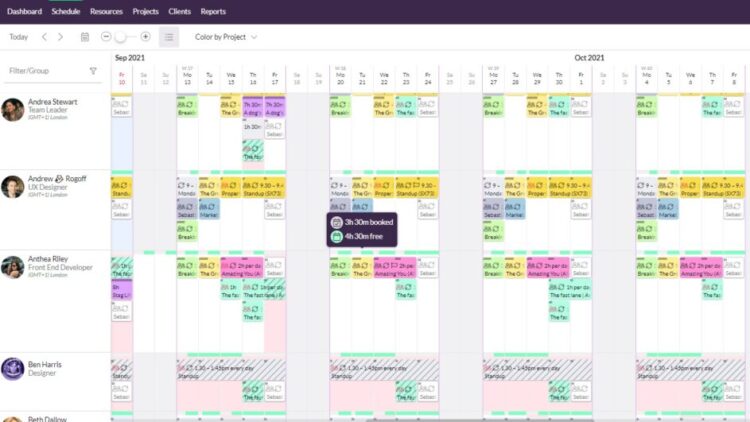In today’s ultra-competitive business environment, time is a precious commodity. That’s why, to stay competitive and maximise productivity, businesses need to master time management, which leverages time tracking software to streamline operations. Read on as we explore the various ways in which businesses can use employee time tracking to transform their operations and drive success.
1. Enhancing Project Management
Effective project management is crucial for businesses to deliver projects on time and within budget. By implementing a robust time tracking system, businesses can gain valuable insight into how time is allocated across various tasks and projects. This data allows project managers to accurately estimate project timelines, create employee schedules quickly and easily, set realistic deadlines, and allocate resources accordingly.
With a clear understanding of how time is being spent, managers can identify potential bottlenecks, address them proactively, and optimise project workflows for improved efficiency. Time tracking also provides visibility into each team member’s contributions, enabling better resource allocation and facilitating collaboration by ensuring the right people are assigned to the right tasks at the right time.
2. Improving Time Accountability

Accountability is essential for fostering a productive work environment, and one way to ensure accountability is through employee time tracking, which helps to promote a culture of responsibility by making individuals aware of their time allocations. With accurate time tracking tools in place, employees can develop a better sense of ownership over their tasks and projects, while becoming more conscious of time wastage and non-productive activities.
Time tracking also helps identify and address distractions or inefficiencies that can impact their productivity, so, by holding employees accountable for their time, businesses create a more focused and efficient workforce.
3. Optimising Workforce Efficiency
Optimising workforce efficiency should be a top priority for businesses seeking to maximise their productivity and profitability. By enabling businesses to analyse and optimise workforce efficiency by capturing time data across different tasks and projects, employee time tracking can help managers of businesses identify areas where productivity can be improved.
Managers can identify repetitive or time-consuming tasks that could benefit from automation, delegation, or process streamlining, which in turn leads to reduced time wastage, increased output, and improved overall efficiency. Time tracking also helps managers identify and address workload imbalances, ensuring that team members are neither overloaded nor underutilised, ultimately enhancing workforce productivity and job satisfaction.
4. Facilitating Accurate Resource Allocation

Accurate resource allocation is vital for businesses to make the most efficient use of their available resources, and employee time tracking plays a pivotal role in facilitating this. By tracking and analysing time data, businesses can gain insight into how resources, including employees, are being utilised, enabling managers to make informed decisions regarding resource allocation, and ensuring that the right resources are assigned to the right tasks at the right time.
By aligning resources with project requirements based on accurate time tracking data, businesses can optimise productivity, minimise bottlenecks, and prevent resource shortages or overloads.
5. Enhancing Employee Productivity
We all know that employee productivity is the lifeblood of any successful business, which is why employee time tracking is so important as it helps managers identify productivity patterns and provides opportunities for improvement. By analysing time data, managers can identify roadblocks, streamline workflows, and implement productivity-boosting strategies.
Additionally, transparent time tracking systems foster healthy competition among employees, as they can compare their time allocation and productivity levels, which should help motivate individuals to work more efficiently and result in a boost to their overall productivity.
6. Ensuring Compliance and Fairness

In many industries, accurate time tracking is not only important for operational efficiency but also for regulatory compliance and fair compensation practices. Employee time tracking systems can be used to provide an auditable record of hours worked, helping to ensure a business’s compliance with labour laws and regulations.
This is particularly crucial for businesses that need to adhere to specific labour standards or produce accurate reporting for client billing purposes. Accurate time tracking also enables businesses to pay employees fairly based on their actual work hours, eliminating discrepancies, promoting a sense of fairness within the organisation, and helping to foster a positive work culture where everyone is treated equitably.
7. Enhancing Client Communication and Billing Accuracy
Accurate time tracking is crucial for businesses that bill clients based on billable hours or project milestones. Employee time tracking systems can provide a transparent and detailed record of the time spent on client projects, enabling businesses to generate accurate invoices, improving billing accuracy and reducing disputes. With real-time visibility into project progress and time allocation, businesses can proactively communicate with clients, providing them with timely updates, and fostering stronger client relationships.
8. Identifying Training and Development Needs

Employee time tracking can also shed light on areas where employees can benefit from additional training and development. By analysing time data, managers can identify tasks or projects that consistently require more time or result in errors, which in turn helps identify skill gaps or training needs that, once addressed, can lead to improved performance and efficiency. Ultimately, investing in targeted training programs based on time tracking analysis can result in a more skilled and productive workforce.
9. Streamlining Remote Work and Flexible Arrangements
With the rise of remote work and flexible work arrangements, employee time tracking becomes even more valuable, especially with remote teams that may work across different time zones or have flexible schedules, making it challenging to track and manage time effectively.
Time tracking tools designed for remote work enable businesses to monitor and manage their employees regardless of their geographical location or work hour variations. This streamlined approach helps remote and flexible workers remain accountable and enables seamless collaboration and coordination across the organisation.
Employee time tracking has the power to revolutionise business operations in numerous ways. From enhancing project time management and improving time accountability to optimising workforce efficiency and facilitating accurate resource allocation, time tracking tools provide valuable insights that drive success.
By mastering time through effective time tracking, businesses can unlock new levels of productivity, efficiency, and profitability, and embracing this transformative tool will undoubtedly give businesses a competitive edge in today’s fast-paced world.







